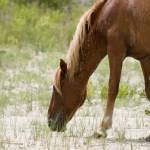Respiratory Disease Found in Florida and Texas Horses

Nasopharyngeal cicatrix syndrome (NCS) is a respiratory condition seen most often in horses living in south-central Texas and the panhandle area of Florida.
First described 30 years ago, the disease is characterized by coughing, nasal discharge, noisy breathing, exercise intolerance, flared nostrils, increased heart rate, and an extended head and neck. Endoscopy reveals inflammation and scarring of structures in the horse’s throat. These changes lead to narrowing of the airway and loud breathing. In severe cases, a tracheostomy may be necessary to allow air to flow freely.
Horses with NCS may be diagnosed as “roarers” because of their loud breathing. Others show coughing and nasal discharge in spring and summer, leading to a diagnosis of allergies. Endoscopic examination of these horses sometimes shows that they are experiencing the acute inflammatory stage of NCS, so medication for allergies won’t help them.
Horses that develop noisy breathing or other signs should be checked by a veterinarian so that NCS can be identified if it is the cause of the problems. If a tracheostomy is called for, it can be done before the horse suddenly develops extreme trouble breathing.








